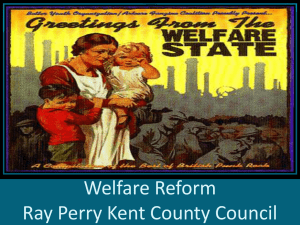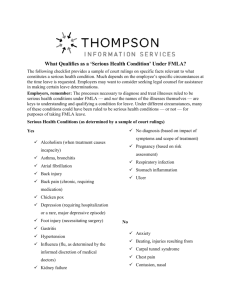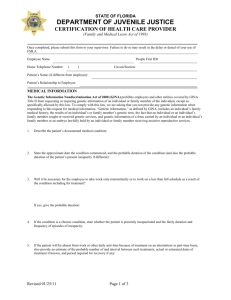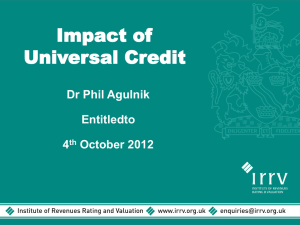Studying and claiming benefits as `incapable of work`
advertisement
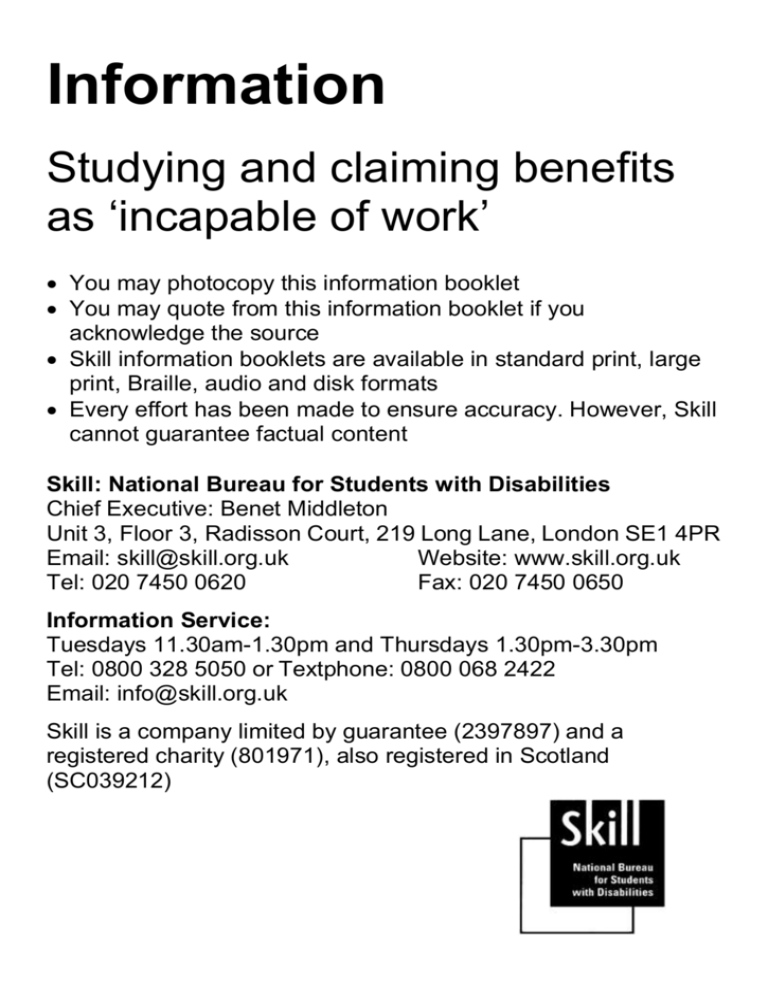
Information Studying and claiming benefits as ‘incapable of work’ You may photocopy this information booklet You may quote from this information booklet if you acknowledge the source Skill information booklets are available in standard print, large print, Braille, audio and disk formats Every effort has been made to ensure accuracy. However, Skill cannot guarantee factual content Skill: National Bureau for Students with Disabilities Chief Executive: Benet Middleton Unit 3, Floor 3, Radisson Court, 219 Long Lane, London SE1 4PR Email: skill@skill.org.uk Website: www.skill.org.uk Tel: 020 7450 0620 Fax: 020 7450 0650 Information Service: Tuesdays 11.30am-1.30pm and Thursdays 1.30pm-3.30pm Tel: 0800 328 5050 or Textphone: 0800 068 2422 Email: info@skill.org.uk Skill is a company limited by guarantee (2397897) and a registered charity (801971), also registered in Scotland (SC039212) Skill would like to thank Disability Alliance for updating this booklet Studying and claiming benefits as ‘incapable of work’: Incapacity Benefit, Severe Disablement Allowance and Income Support Contents 1 What are incapacity benefits? 2 What benefits might you be on? 3 About your claim 4 Studying but not capable of work? 5 Grants and loans 6 Useful resources 1 Page 2 4 6 10 19 20 About this booklet This booklet explains: who can claim incapacity-related benefits what might happen to these benefits when you start studying where to go for more advice and guidance. Calculating what you are entitled to can be complicated. It depends on your own circumstances and your level of income. If you need help to work out how much you are entitled to, ask your Students’ Union welfare adviser or your local Citizens Advice Bureau. Skill can’t advise on individual benefit claims or make benefit calculations for you. Important information From 27 October 2008, Employment and Support Allowance (ESA) replaced Income Support and Incapacity Benefit as the benefit for people who are sick or disabled and unable to work. You may still be able to claim Incapacity Benefit under certain circumstances. There are some linking rules and cases where you make a claim for Incapacity Benefit after 27 October 2008 and you are already getting Income Support because you are sick or disabled. The information in this booklet is for students who claimed incapacity-related benefits before the introduction of ESA. In this booklet, ‘partner’ means husband or wife or civil partner, or someone who lives with you as though they were your husband or wife or civil partner. 2 1 What are incapacity benefits? When you start studying you need to know where the money for your everyday living costs is going to come from. If you are considered incapable of work because of your impairment or medical condition, your living costs may be paid through incapacity benefits. Claims for most incapacity benefits are processed by Jobcentre Plus. 3 2 What benefits might you be on? The benefits system divides people into two groups: people who are expected to work and people who are not expected to work. You are not expected to work if you are considered ‘incapable’ of work because you are disabled. Before the introduction of Employment and Support Allowance there were three main benefits to replace the earnings of people who are not able to work, which you may still be receiving. Incapacity Benefit is for people who are unable to work because of illness or because they are disabled. There are two types of Incapacity Benefit: Contributory-Based - this depends on National Insurance contributions. You only get it if you have worked for long enough before becoming sick or disabled and have paid enough National Insurance contributions and NonContributory-Based or ‘Incapacity Benefit in Youth’ - this does not depend on National Insurance contributions. It is for people aged 16 to 19 (or under 25 for students or trainees who were in education before age 20). Severe Disablement Allowance (SDA) was abolished in April 2001 and replaced by the Non-Contributory Incapacity Benefit. If you were already getting SDA before it was abolished you will continue to get this benefit. To find out about Severe Disablement Allowance and studying, read section 4 on Incapacity Benefit and studying, as the same rules apply. Income Support (IS) is paid to people under 60 who have a low income and do not have to sign on as available for work, including people who are incapable of work. If you’ve been getting Incapacity Benefit for 52 weeks or more (long-term Incapacity Benefit) you may be able to get an extra benefit, called 4 the ‘Disability Premium’, when you claim Income Support, Housing Benefit or Council Tax Benefit. Disability Living Allowance This is paid to people who have care or mobility needs whether or not they are capable of work, and whether or not they are working or studying. Disability Living Allowance also qualifies you to get the ‘Disability Premium’ when you claim Income Support, Housing Benefit or Council Tax Benefit. You can read Skill’s information booklet Income Support for disabled students and Housing Benefit and Council Tax Benefit for Disabled Students for full details. 5 3 How do I claim incapacity benefits? You may have to attend a work-focused interview with a Jobcentre Plus Personal Adviser. This will be an interview to discuss whether or how you can move into work now or in the future. If you are making a claim for Incapacity Benefit think about applying for Income Support, Housing Benefit and Council Tax Benefit too. If you qualify they can be paid on top of your Incapacity Benefit or Severe Disablement Allowance. However, they will be counted as income when deciding how much you will get. You will also have to satisfy the Personal Capability Assessment test, unless you are considered exempt. This is explained on page 7. You can read Skill’s information booklet Income Support for disabled students and Housing Benefit and Council Tax Benefit for Disabled Students for full details. Finding more information For more information on how to claim these benefits read the leaflets produced by the Department for Work and Pensions (DWP) leaflet or phone the Benefit Enquiry Line. Their contact details are in the Useful Resources section of this booklet. Jobcentre Plus can often arrange interpreters and sign language interpreters if you need them, but always tell the office in advance. They can also arrange home visits if this is the only satisfactory way of handling your claim. 6 What is the Personal Capability Assessment? This is a test for people who are claiming Incapacity Benefit or Income Support which looks at your ability to do all types of work. The Department for Work and Pensions (DWP) looks at how well you can carry out a range of physical activities, such as walking, sitting, lifting, carrying, bending, seeing and hearing. If you have mental health problems or learning difficulties they will look at how well you can carry out a range of mental healthrelated activities. These include your ability to concentrate or your reaction to stressful situations. You will have to fill in a questionnaire called an IB50 as part of the test. You may also have to get a doctor's statement known as a Med 4. Your doctor will only be asked to comment on your medical condition, not your capacity for work. The DWP may also ask you to attend a medical examination. Some people do not have to take the Personal Capability Assessment. For example, you will be considered exempt if you: are receiving the highest care component of Disability Living Allowance (DLA); or are terminally ill; or have a certain specific condition - for example, if you are registered blind, have paraplegia or tetraplegia, or have severe mental health difficulties. You can check the full list of exemptions at www.disabilityalliance.org/f25.htm. What are work-focused interviews? If you claim Incapacity Benefit or Income Support, as well as some other benefits, you may have to attend a series of workfocused interviews. These are held with a Jobcentre Plus Personal Adviser to talk about your work prospects. 7 The personal adviser is the single point of contact for all your benefit questions. They have information on work and benefits and services such as childcare. Jobcentre Plus premises must be accessible, or the adviser should arrange an alternative venue or home visit. You can also take someone to the work-focused interview with you such as a friend, parent or advocate. This interview may seem like an extra hurdle for people who cannot work, but you may find it useful to talk to the adviser. If you are thinking about going back to work, the Jobcentre Plus adviser can help you find suitable voluntary work or training and look at your prospects for finding paid work. When do they happen? You will have work-focused interviews: when you first claim at set intervals; or at ‘trigger points’, such as the start or end of a course. Do I have to attend? The personal adviser may waive the interview (say you don’t have to attend) or defer it (move the interview to a later date) if they think that it would 'not be of assistance' or 'appropriate in the circumstances' for you to attend. If your attendance has been waived you are treated as if you had taken part in the interview. You also don’t have to attend a work-focused interview if: you are aged 60 or over you are about to start work you are working 16 hours or more a week 8 you are exempt from the Personal Capability Assessment. If your attendance has been deferred you will have to attend a work-focused interview later on. You must attend this interview. If you don’t attend and you don’t have ‘good cause’ (a valid reason), your claim may lapse or you may get less benefit. If you are a new claimant and you don’t attend, then your claim will be refused. What if I think a decision is wrong? You can appeal against decisions that say: you failed to take part in an interview; or you did not have a good cause for not taking part; or that your benefit should be reduced. You do not have to take any steps to get a job after the interview if you don’t want to. 9 4 What happens if I’m studying but not capable of work? There is no rule that says you can’t get Incapacity Benefit while you are studying. But there are special rules if you are under 19. If you are under 19, you are only allowed to do up to 21 hours of mainstream education per week. However, the Department for Work and Pensions (DWP) will not count hours of teaching that are only appropriate for disabled students, because of the particular subject or specific teaching method. This means that any hours of specialist tuition or specialist support you have in your mainstream class should not be counted. Am I automatically capable of work because I’m capable of studying? Some people think that being able to study proves that you are capable of work. Some staff at the DWP may also think this. In fact, it depends entirely on the kind of course you are going to do. Many courses are very different to employment, even if they are full-time. You can be capable of study but not capable of working. For example, if your course involves a lot of practical work on most days, this may show that you are capable of working. But if your course involves ten hours of lectures a week and private reading for the rest of the time, this does not automatically prove that you are capable of working. 10 What are the common differences between studying and working? Flexibility - many courses are flexible in the way you can study. If you miss a day you can catch up. You can plan your own study methods and timetable around your own needs and your own strengths and weaknesses. Support arrangements - your college or university may have made adjustments to the course to make it easier for you to study. For example, you may have more flexible deadlines, or personal support and equipment, such as a notetaker or a computer to study from home. The kind of tasks you do - for benefit claims, your capacity for work is assessed on your ability to do mainly physical tasks like standing, sitting, walking, or carrying. There are different criteria for people with mental health difficulties. Your course may involve different kinds of tasks. The number of hours - in higher education in particular, the time you spend each week in formal working conditions, such as lectures, classes and seminars, can be much less than in paid employment. On a full-time course, you may be doing fewer hours than most part-time workers. The level of pressure - in paid employment the pressure to perform for other people can be an issue, especially if you have mental health difficulties. You are usually more self-motivated when doing a course, which makes studying more possible than working for some people. How can I explain this to Jobcentre Plus? If you have to explain why you can do your course but you’re not capable of working, use this list of reasons. You can also mention any other factors that apply to you. Give the Jobcentre Plus specific information about your course, such as the number of hours of formal study, the arrangements 11 for catching up on missed work, and what support you are going to use. When you tell Jobcentre Plus about your course, they will ask about the level and the subject of the course, how long it lasts, and what it involves – for example, work placements or home study. You may want to get advice or support before doing this. You can ask your Students’ Union or college welfare officer, a local welfare rights unit, or a Citizens Advice Bureau. Many disabled people begin to study as a route into work or as part of a rehabilitation process. Jobcentre Plus may take this into account when assessing your claim. Do I have to tell the DWP that I am starting a course? If you receive a welfare benefit you must tell the DWP about any relevant changes in your circumstances. If you have a benefit book it will list the types of changes you should report. If starting a course is not mentioned in this list the DWP will still expect you to tell them because it might affect your benefit entitlement. You must also report any change in financial circumstances, such as being eligible for a grant or a student loan. If the DWP review your entitlement later on and decide you are capable of work, and you did not tell them about starting your course, they may ask you to repay any benefit you received while studying. Will the DWP query my claim? A decision maker the DWP will decide whether or not you qualify for benefit. They will look at the information you have given about your course. They can make their own decisions and do not have 12 to agree with your doctor about whether or not you can work. Your doctor will only be asked to comment on your medical condition if you are being assessed under the Personal Capability Assessment. If the DWP decides that you are still incapable of work they will take no action. However, if the DWP thinks that you may be able to work, they will carry out a re-assessment. This is to see whether the old decision should be changed. Starting education may trigger a review of your claim but it can’t be used to decide that you are now capable of work. What happens if the DWP review my benefit claim? Even though your benefit is being reviewed it doesn’t mean that it will automatically be stopped. Unless you have come to the end of a fixed period of benefit entitlement, the DWP have to prove that you are no longer eligible for the benefit. If you are on Incapacity Benefit or Income Support, you will probably receive a Personal Capability Assessment questionnaire (form IB50). This will ask for information about how your impairment or long-term medical condition affects your ability to work. You must complete this form. If you don’t, your benefit may be stopped. You may also have to get a Med 4 form from your doctor. When the DWP looks at your Personal Capability Assessment questionnaire they may see straight away that you are not able to work. At this stage they may tell you that you can carry on with your course and still receive your benefit. If it’s not clear whether or not you are able to work, the DWP will ask you to attend a medical examination by one of their own doctors. The medical will be in your local area and you can 13 claim travel costs. You can also have a friend, adviser or interpreter with you during the medical. After the medical, the DWP doctor will make a recommendation to the decision maker. The decision maker will then decide whether your benefit should continue. Your benefit shouldn’t stop if you have not had or have not been offered a medical examination, unless you didn’t complete form IB50 when asked. What can I do if the DWP refuse to pay me benefit? The DWP will usually write to you with the reasons why they think you are able to work. If they don’t write, you have one month to ask for a letter. If you disagree with the decision you can ask them to revise it. This is a less formal way of resolving the disagreement. If you are unhappy with result of the revision, you can make an appeal to an appeal tribunal. You can appeal against the decision to an independent appeal tribunal, by completing an Appeal form (GL24). You do not have to ask for a revision first. The tribunal panel will be a lawyer and a doctor. Time limits You have one month from the day the DWP sends you their decision to appeal against it or to ask for a revision. This can be extended by up to 12 months under ‘special circumstances’ but try to stick to the one-month time limit. Special circumstances can include illness, bereavement or being out of the country. 14 While you are waiting for your appeal to be heard, you will not be able to get your usual Incapacity Benefit or Severe Disablement Allowance benefit. However, you may be able to claim Jobseeker’s Allowance. This will protect your National Insurance record and will not have a negative effect on the outcome of your appeal. You must be available for and actively looking for employment to be able to get this benefit. Alternatively, you may be able to claim Income Support on the grounds that you are appealing against a decision that you are capable of work. You will be paid Income Support although your personal allowance will be reduced by 20%. If your appeal is not successful your benefit will stop. You can appeal again to the Upper Tribunal Administrative Appeals Chamber but only if there has been an ‘error of law’. You should ask for advice about this. You can appeal above the Upper Tribunal to the Court of Appeal if you have permission from the Tribunal or if there are special reasons. You may need to get legal advice if you decide to do this. If your appeal is successful you will start getting your benefit again, as well as the money you would have got during the time of your appeal. Advice if you want to make an appeal Talk to an advice worker experienced in benefit issues and appeals. Your Students’ Union or college welfare officer may be able to help you. If they have no benefit appeals experience, it may be best to contact a local welfare rights unit (independent or run by the local council) or a Citizens 15 Advice Bureau (CAB). Ask your college welfare officer or local library for contact details. Make your appeal within one month of receiving the initial decision letter. Keep copies of all decision letters, evidence you have sent and letters you have written. Always put an appeal in writing and include your National Insurance number as a reference. Use the correct form if possible so you know all the necessary information is included. You can choose not to use form GL24 but always make sure you include the following information in your appeal letter. - The name of the benefit you are appealing about, for example Incapacity Benefit. - The date on the Jobcentre Plus letter that gave the decision you are appealing against - A summary of the reasons why you think the decision is wrong. It is not enough to say that you disagree. You must say clearly why you think you should still get your benefit. Remember that the DWP thinks you are capable of work. You must first emphasise that you are not capable of work. Then explain that although you can’t work you are able to study, and say why. If the Personal Capability Assessment shows you are capable of work, the DWP will send you a summary of the assessment. The assessment awards points for how difficult you find a particular acitivity. You need a certain number of points to be accepted as incapable of work. Ask a benefits adviser about how the points are awarded. You can see a summary of the test at www.disabilityalliance.org/f25.htm. Prepare a summary for the appeals tribunal giving details of your health problems and why you think you are incapable 16 of work. Refer to the specific activities where you think your points score should have been higher. Check that they have taken into account the effects of pain, stress, fatigue or medication on your ability to work. Check that they have assessed your ability to do things without assistance. Check that they have assessed your ability to do things reliably, safely or repeatedly, taking account of good and bad days. Under the Personal Capability Assessment you do not have to send in medical certificates, but it may help if you can get a letter of support from your own doctor or specialist, saying why they think you should have scored higher in certain activities. Where to get more information about appeals Disability Rights Handbook, published by Disability Alliance Welfare Benefits Handbook, published by Child Poverty Action Group (CPAG) If you think our decision is wrong, available from Jobcentre Plus offices or the Benefit Enquiry Line. Making a complaint, Skill’s booklet for more information on making appeals or complaints about benefits. The contact details for these organisations are in the Useful Resources of this booklet. What happens if my benefit is stopped, I start a course and then find that I can’t continue with it? Can I reclaim my previous benefit entitlement? 17 Any two periods of incapacity are joined together if they are less than eight weeks apart. If this happens, you do not have to go through the usual qualifying period. If you stop claiming and within a week start a training course for which you get a training allowance, or you start paid work, then you can link your periods of incapacity by 104 weeks instead. You must have been incapable of work for at least 196 days to do this. This means you can return to your previous benefit level if you become incapable of work again. You can also be considered incapable of work without having to satisfy the Personal Capability Assessment for up to 13 weeks provided you send in medical certificates. 18 5 What about grants and loans? If I can keep my benefit will a grant or loan affect it? The amount of grant or loan you get does not affect the amount of Severe Disablement Allowance, Incapacity Benefit or Disability Living Allowance you get. For Income Support, which is a means-tested benefit, elements of grants and loans given for everyday living costs will be counted and will affect the amount of benefit you can get. There is more information about this in Skill’s booklet Income Support for disabled students. Will grants or loans for higher education be affected by the benefit? With financial support for undergraduate students, your contribution to the fees and part of your loan are means-tested. However, Incapacity Benefit, Severe Disablement Allowance and Income Support are completely ignored. 19 6 Useful Resources Annual publications Disability Rights Handbook Published by Disability Alliance First Floor East, Universal House, 88-94 Wentworth Street, London E1 7SA Tel/textphone: 020 7247 8776 Fax: 020 7247 8765 Priced publication. Has detailed information on all sickness and disability benefits. Gives examples of Income Support / Housing Benefit calculations. Welfare Benefits Handbook Published by the Child Poverty Action Group 94 White Lion Street, London N1 9PF Tel: 020 7837 7979 Fax: 020 7837 6414 Priced publication DWP leaflets DLAA5DCS - Disability Living Allowance GL24DWP - If you think our decision is wrong HB5 - A guide to non-contributory benefits for disabled people and their carers NI260 - A guide to Revision, Supersession and Appeal Available from the DWP website at www.dwp.gov.uk (Benefits A-Z section). Leaflets also include benefits claim forms. 20 Other Skill information booklets Funding further education for disabled students Funding higher education for disabled students Housing Benefit and Council Tax Benefit for disabled students Income Support for disabled students Organisations offering advice or services to disabled students Making a complaint Available in alternative formats. Price £2.50 each. Disabled students or jobseekers can get up to 5 booklets free of charge. You can order the booklets from Skill’s online Bookshop or contact the Information Service. You can also download them as Word documents from the Information Sheets section of the website. Organisations Benefit Enquiry Line for disabled people England, Scotland, Wales: Tel: 0800 882 200 Text: 0800 243 355 (Open Monday to Friday 8.30am to 6.30pm, Saturday 9am to 1pm) Northern Ireland: Tel: 0800 220 674 Text: 0800 243 787 (Open Monday to Friday 9am- 5pm) Benefits Agency / DWP Website: www.dwp.gov.uk Free advice service provided by the Benefits Agency Citizens Advice Bureaux (CAB) Your local CAB should be listed in the telephone directory and details are also on the national website: www.citizensadvice.org.uk 21 This site also links to the CABs welfare benefits advice guide that is available at www.adviceguide.org.uk Dial UK (national office) Tel: 01302 310 123 Fax: 01302 310 404 Email: informationenquiries@dialuk.org.uk Website: www.dialuk.info Network of disability information and advice line services (DIALs). The national office will give you details of your nearest service. Local DIALS can give advice on issues such as welfare benefits, community care, equipment, independent living, and transport. Students’ Unions Most Students’ Unions in universities and colleges have a welfare department or welfare officer who can give advice about benefits and help you with calculations. Welfare Rights Units These are run by local authorities. Contact your local council or local library to find out if there is one in your area. April 2009 22
